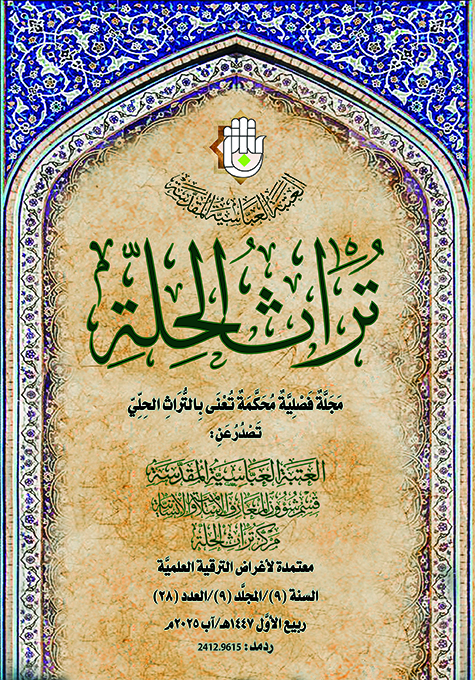Abstract
This research examines and analyzes the historical narrations “Historical isnads” within the school of the renovator jurist Ibn Idris Al-Hilli (d.598 AH). This serves as a methodological approach to uncover his stance on historical reports and texts, particularly in the context of narrations concerning the virtues of the Household of the Prophet (Ahl al-Bayt), peace be upon them.
The study traces the foundational principles of Ibn Idris’s sanad (chain of transmission) methodology and his basis for critiquing historical and narrative transmissions. This is explored in light of the rules of juristic and theological verification. The research also highlights his practices in scrutinizing narrations and relying on specialists in the fields of history and genealogy.
The research also discusses his strong rejection of weak and solitary narrations (akhbar Al-ahad), and his reliance on mutawatir (concurrent) or reliable narrations that convey knowledge and certainty. It highlights his stance on consensus (ijma) as supporting evidence, rather than an independent source, especially in matters that contradicted the narrations of Ahl Al-Bayt or clashed with the principles of the doctrine. The research also underscores his focus on correcting historical narrations and his disagreement with several early scholars, such as Shaykh Al-Mufid and Al-Tusi, based on his meticulous investigation of sources and positions.
In the applied section, the research presents a collection of narrations transmitted by Ibn Idris in his fiqhi (jurisprudential) and kalami (theological) works, especially “Al-Sara’ir.” These narrations concern the virtues of Ahl Al-Bayt (peace be upon them), such as the Mubahala with the Christians of Najran, the Hadith of Fitrus, the Hadith of Mawaddah, the visitation of Imam Husayn, and others. It demonstrates how his isnadi (chain of transmission) and rational methodology contributed to the selection of these narrations and the establishment of their position in fiqhi and doctrinal argumentation.
Keywords: Historical chains of transmission, IIbn Idris al-Hilli,
the Jurisprudence School, the virtues of Ahl al-Bayt (PBUT).
The study traces the foundational principles of Ibn Idris’s sanad (chain of transmission) methodology and his basis for critiquing historical and narrative transmissions. This is explored in light of the rules of juristic and theological verification. The research also highlights his practices in scrutinizing narrations and relying on specialists in the fields of history and genealogy.
The research also discusses his strong rejection of weak and solitary narrations (akhbar Al-ahad), and his reliance on mutawatir (concurrent) or reliable narrations that convey knowledge and certainty. It highlights his stance on consensus (ijma) as supporting evidence, rather than an independent source, especially in matters that contradicted the narrations of Ahl Al-Bayt or clashed with the principles of the doctrine. The research also underscores his focus on correcting historical narrations and his disagreement with several early scholars, such as Shaykh Al-Mufid and Al-Tusi, based on his meticulous investigation of sources and positions.
In the applied section, the research presents a collection of narrations transmitted by Ibn Idris in his fiqhi (jurisprudential) and kalami (theological) works, especially “Al-Sara’ir.” These narrations concern the virtues of Ahl Al-Bayt (peace be upon them), such as the Mubahala with the Christians of Najran, the Hadith of Fitrus, the Hadith of Mawaddah, the visitation of Imam Husayn, and others. It demonstrates how his isnadi (chain of transmission) and rational methodology contributed to the selection of these narrations and the establishment of their position in fiqhi and doctrinal argumentation.
Keywords: Historical chains of transmission, IIbn Idris al-Hilli,
the Jurisprudence School, the virtues of Ahl al-Bayt (PBUT).
Keywords
Historical chains of transmission
IIbn Idris al-Hilli
the Jurisprudence School
Abstract
يتناول هذا البحث بالدراسة والتحليل الأسانيد التاريخيَّة في مدرسة الفقيه المجدِّد ابن إدريس الحِلِّيّ (ت598هـ)، بوصفها مدخلًا منهجيًّا للكشف عن موقفه من الروايات والنصوص التاريخيَّة، لاسيما في سياق روايات فضائل أهل البيت، ويتتبَّع البحث مرتكزات المنهج السَّنديّ لدى ابن إدريس، وأُسُس نقده للنقل التاريخيّ والروائيّ في ضوء قواعد التحقيق الفقهيّ والكلاميّ، مشيرًا إلى ممارساته في التدقيق الإسناديّ، والاعتماد على أهل الاختصاص في فنون التاريخ
والأنساب.
كما يناقش البحث رفضه الشديد للأخبار الضعيفة والآحاد، واعتماده على الروايات المتواترة أو الموثوقة، التي تفيد العلم واليقين، مع تسليط الضوء على موقفه من الإجماع كقرينةٍ داعمةٍ، لا كمصدرٍ مستقلٍّ بذاته، خصوصًا في المسائل التي خالفت روايات أهل البيت، أو تضاربت مع أصول المذهب.
ويُبرز البحث اهتمامه بتصحيح الروايات التاريخيَّة، ومخالفته لعدد من العلماء المتقدِّمين، مثل الشيخ المفيد، والشيخ الطوسيّ، بناءً على تحرِّيه الدقيق للمصادر والمواقف.
وفي القسم التطبيقيّ، يعرض البحث مجموعة من الروايات التي نقلها ابن إدريس في كتبه الفقهيَّة والكلاميَّة، وبخاصَّة (السـرائر)، حول فضائل أهل البيت، كمباهلة نصارى نجران، وحديث فطرس، وحديث المودَّة، وزيارة الإمام الحسين، وغيرها، ويبيِّن كيف أسهم منهجه السَّنديّ والعقليّ في انتقاء هذه الروايات، وترسيخ موقعها في الحجاج الفقهيّ والعقائديّ.
الكلمات المفتاحيَّة: الأسانيد التاريخيَّة، ابن إدريس الحِلِّيّ، المدرسة الفقهيَّة، فضائل أهل البيت عليهم السلام.
والأنساب.
كما يناقش البحث رفضه الشديد للأخبار الضعيفة والآحاد، واعتماده على الروايات المتواترة أو الموثوقة، التي تفيد العلم واليقين، مع تسليط الضوء على موقفه من الإجماع كقرينةٍ داعمةٍ، لا كمصدرٍ مستقلٍّ بذاته، خصوصًا في المسائل التي خالفت روايات أهل البيت، أو تضاربت مع أصول المذهب.
ويُبرز البحث اهتمامه بتصحيح الروايات التاريخيَّة، ومخالفته لعدد من العلماء المتقدِّمين، مثل الشيخ المفيد، والشيخ الطوسيّ، بناءً على تحرِّيه الدقيق للمصادر والمواقف.
وفي القسم التطبيقيّ، يعرض البحث مجموعة من الروايات التي نقلها ابن إدريس في كتبه الفقهيَّة والكلاميَّة، وبخاصَّة (السـرائر)، حول فضائل أهل البيت، كمباهلة نصارى نجران، وحديث فطرس، وحديث المودَّة، وزيارة الإمام الحسين، وغيرها، ويبيِّن كيف أسهم منهجه السَّنديّ والعقليّ في انتقاء هذه الروايات، وترسيخ موقعها في الحجاج الفقهيّ والعقائديّ.
الكلمات المفتاحيَّة: الأسانيد التاريخيَّة، ابن إدريس الحِلِّيّ، المدرسة الفقهيَّة، فضائل أهل البيت عليهم السلام.
Keywords
الأسانيد التاريخيَّة، ابن إدريس الحِلِّيّ، المدرسة الفقهيَّة
